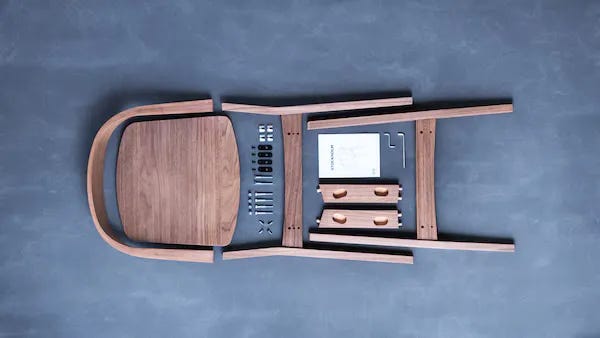The IKEA effect: Doing things for ourselves makes us happier
A business strategy that became a psychological phenomenon
🏷️ Categories: Motivation, Decision making and biases, Goals, Happiness.
In the 1950s, the furniture industry was dominated by manufacturers delivering finished, expensive products. However, in a corner of Sweden, a man named Ingvar Kamprad would revolutionize the way we think about home furnishings. Ingvar founded IKEA, a company with a different vision: to sell affordable, functional furniture that customers would assemble themselves.
Who would want to spend hours assembling a cabinet, chair or bookshelf?

That was the first question that arose. The idea was questioned at first, but it was a strategy to reduce transportation and storage costs, since disassembled furniture took up less space. By reducing costs, Ignvar's company could be more competitive. What they didn't expect was the tremendous impact this decision would have on the customer?
The IKEA effect occurred.
What is the Ikea Effect?
The Ikea Effect explains that people tend to value more highly products in which they have invested time and effort to achieve a successful result. Feeling part of the process generates emotional attachment to the end result (Norton et al., 2011).
It's the perfect business.
Not only does IKEA save money by selling the furniture unassembled and making the production process more efficient, but the customer also enjoys the furniture more.
Why does the IKEA effect happen?
If you work hard to achieve something, you are more satisfied with the result achieved.
It's the same principle that explains why people enjoy playing sports and beating their records. When we invest time and energy into something, we attribute more value to it just because of the effort we put into it. If we put effort into assembling a bookshelf, we are more likely to perceive it as valuable. If life put up no resistance and everything was achieved instantly, no goal would be motivating.
The funny thing is that this feeling makes us overvalue our results.
In one experiment, people were asked to make origami figures. Interestingly, participants rated their creations higher than others, even though theirs were objectively worse (Norton et al., 2011).
Buying the chair you needed feels good.
Making the chair you needed feels really good.
How the IKEA effect affects us
It's not just about assembling furniture.
1. Marketing
Companies, aware of the effect, design products that invite the customer to participate in the creation process, which increases customer loyalty, creating a connection with the brand. When you assemble a shelf or buy a product to your liking in color, shape or design, you feel that your product is yours, unique and nobody else's.
Tesla, BMW, Porsche and many other brands allow you to customize your car.
Nike, Adidas, Vans, Converse and others let you customize your sneakers.
These are just a few examples from two sectors, but it is becoming more and more common to sell an experience of creation and not just an end product.
2. Decision making
The IKEA effect also leads people to make wrong decisions.
For example, if you have invested a lot of effort in a project or plan, you will think it is more valuable than it really is just because of the effort you put into it, as in the origami experiment. Think about business projects, personal finances...
You may be falling into the sunk cost bias without even realizing it.
3. Personal development
Working hard to achieve something gives you satisfaction and boosts your self-esteem.
If you set personal goals, whatever they may be, you will need time and effort to achieve them, but it is very rewarding to see that little by little you are progressing towards them. That's the key to motivation, to keep track of your efforts to see the results and motivate you to keep going one more day. That's how the Seinfeld method works.
Every day that goes by, you assemble a piece of your goal.
Every day that you train, that you go for a run, that you practice your musical instrument, that you study to pass a test, that you write and beat the blank page.
Every one of those days you are working hard to assemble a dream.
✍️ Your turn: Where do you apply the IKEA effect? I have an orchard and just the fact that I've worked hard to harvest the fruits already makes everything look like a delicacy.
💭 Quote of the day: “Life will give you just what you put into it. Put your whole heart into everything you do and then you'll just have to wait.” Maya Angelou, I Know Why The Caged Bird Sings.
See you next time! 👋
References 📚
Norton, M. I., Mochon, D., & Ariely, D. (2011). The IKEA effect: When labor leads to love. Journal Of Consumer Psychology, 22(3), 453-460. URL









This is a very interesting perspective on IKEA furniture because by far the majority opinion of IKEA in my very small social circle is quite the opposite. IKEA means you can't afford the nicer item so you have to settle, and on top of that have to put it together with incomprehensible instructions and often missing pieces. Basically hugely frustrating. Don't get me wrong - I'm a fan because I'm handy and I love a project. But mine is often a minority opinion.